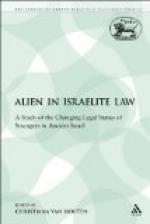|
This section contains 2,526 words (approx. 9 pages at 300 words per page) |

|
Like Israelite law in general, Israelite property law is marked by a concern for the rights of the individual. In particular an attempt is made, at least in theory, to safeguard the rights of the less fortunate (the poor, widows, orphans, etc.). As will be seen in this article, Israelite property law shares many points of contact, both in actual detail and in terminology, with property laws found elsewhere in the ancient Near East.
Conveyance of Property
As expressed ideally in the laws of the Hebrew Bible, the only transference of property in ancient Israel should be through inheritance. Every Israelite family was allocated a plot of land at the original apportionment, traditionally held to have been in the time of Moses and Joshua (Nm. 26:52–54, 33:54; Jos. 13–22), and it was believed that this ancestral plot should remain, if not in the family's possession, then at least in...
|
This section contains 2,526 words (approx. 9 pages at 300 words per page) |

|




